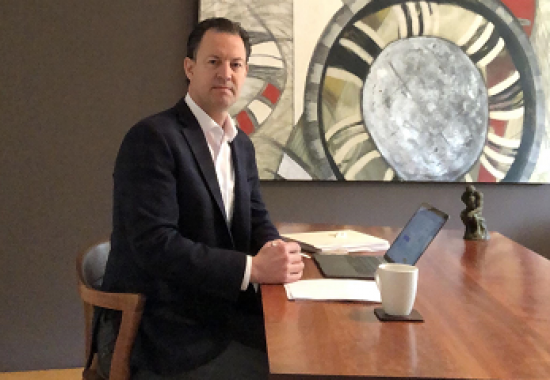To help ensure the safety of our scientists and staff amidst the outbreak of COVID-19, the team at MRRI continues to work remotely to advance our ongoing research. This means that each of us has been adjusting to working from home, holding virtual meetings with team members and collaborators, and conducting research from afar. Though this transition has introduced many challenges, we are proud of the adaptability, resilience, and sense of humor that have prevailed in our team members during this difficult time. Take a look behind-the-scenes at how some of our MRRI scientists are making work from home arrangements work for them.
Dylan Edwards, PhD, MRRI director and director of the Human Motor Recovery Lab, has gotten comfortable working from his home office. He has been instrumental in directing the transition to working remotely and guiding MRRI through these unprecedented circumstances.
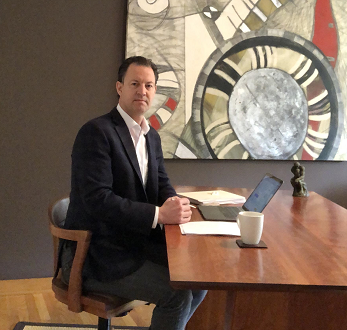
Director of the Sensorimotor Learning Laboratory Amanda Therrien, PhD is continuing to draft manuscripts and grant applications remotely. Like so many of us, the uncertainty and physical isolation of the past several weeks have been challenging. However, she reflects that she is “taking things one day at a time”. Staying positive is important, and Dr. Therrien says that “on the plus side, I have a pretty cute new office mate.”
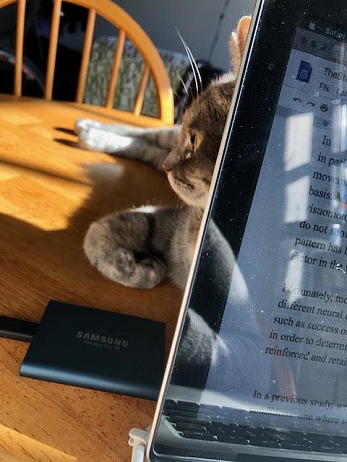
Technical difficulties are bound to be an obstacle as we switch over to virtual meetings with team members, but we’ve been overcoming these issues with a logical approach to troubleshooting, patience, and humor. At a recent lab meeting over Zoom, Shailesh Kantak, PhD, director of the Neuroplasticity and Motor Behavior Laboratory, was surprised to be seeing double as his team member Will Marsh experienced a connection lag while switching between devices as he joined the meeting. Will enjoyed a double dose of lab meeting, though the effect was only temporary. Dr. Kantak noted that “possibly he was missing the lab way too much!”
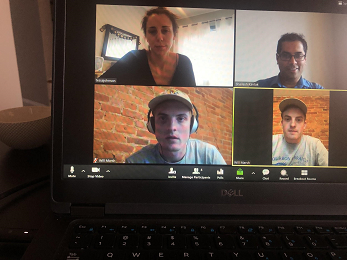
True to the adage that work expands to fill the hours available for its completion, Laurel Buxbaum, PsyD, MRRI associate director and director of the Cognition and Action Lab, is finding that her former commuting time is now filled with extra Zoom meetings with collaborators, administrators, and staff. “Suddenly the commute doesn’t seem so bad,” she jokes. The lab is keeping very busy with grant proposals, manuscripts, and analysis of previously collected data. On the bright side, two submitted manuscripts from Dr. Buxbaum’s lab were accepted within the past two weeks.
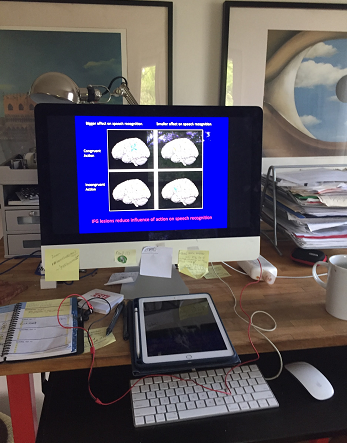
For many of our MRRI team members, working remotely means spending more time with children and family members. However, balancing home life with making progress on research projects can be difficult. Amanda Rabinowitz, PhD, director of the Brain Injury Neuropsychology Laboratory is finding new ways to do it all. For example, she has been conducting secondary analyses on previously collected data while tuning into PBS Kids with her children to maintain productivity from home.
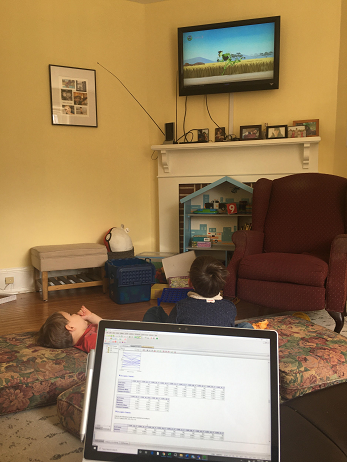
These are just a few snapshots of how the team at MRRI has adapted in response to the novel coronavirus. We are dedicated to working together while apart to continue the momentum on our important neuroscience and neurorehabilitation research projects. Though our physical work environments have changed dramatically, our dedication to improving the lives of individuals with neurological disabilities through research is undiminished.

